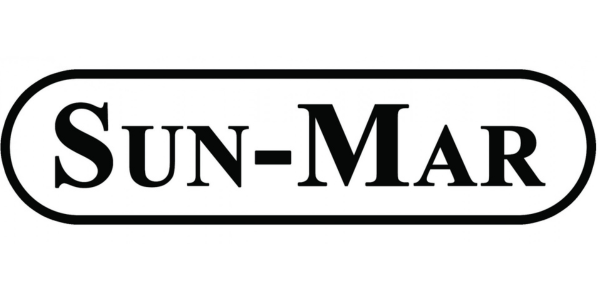About Sun-Mar™
Click the logo to see the full live site on Sun-Mar™ New Zealand
WCTNZ® is proud to distribute the Sun-Mar™ systems throughout New Zealand
Composting toilets use the natural processes of decomposition and evaporation to recycle human waste. Waste entering the toilets is over 90% water, which is evaporated and carried back to the atmosphere through the vent system. The small amount of remaining solid material is converted to useful fertilizing soil by natural decomposition.
This natural process, essentially the same as in your garden composter, is enhanced in commercial composting toilets by manipulating the environment in the composting chamber.
The correct balance between oxygen, moisture, heat and organic material is needed to ensure a rich environment for the aerobic bacteria that transform the waste into fertilizing the soil. This ensures odour-free operation and complete decomposition of waste.
When human waste is properly composted, the end product does not contain any pathogens or viruses (these are destroyed by bacterial breakdown). This nutrient-rich fertilizer can then be used on plants or around the base of trees, as part of the natural cycling of nutrients, reducing your need for commercial fertilizers and preserving local water quality.
A composting toilet must perform three completely separate processes:
- Compost the waste and toilet paper quickly and without odour
- Ensure that the finished compost is safe and easy to handle
- Evaporate the liquid
Different manufacturers have tried different methods to achieve these goals, but none has proved as efficient as the Bio-drum, designed by Sun-Mar, the forerunners of the composting toilet industry since the 1960s.
Many years ago Sun-Mar engineers realized that to work properly, these three tasks required independent chambers, each with its own separate environment. This revolutionary new three-chamber approach first developed in 1979 proved so successful that today it is incorporated into all Sun-Mar units.
THE COMPOSTING CHAMBER (Chamber 1)
Sun-Mar's™ Unique Bio-Drum
The ideal way to compost waste would offer operational simplicity and an environment where there is warmth, moisture, organic material, and oxygen. Sun-Mar™ creates this ideal environment in the patented Bio-drum.
The unique Sun-Mar™ Bio-drum ensures aerobic microbes flourish and work much more quickly to break down waste and convert it back to earth.
Operational Simplicity
Waste and peat mix bulking material enter through the waste inlet port at the top of the drum. To mix and aerate, rotate the drum periodically, simply by turning the handle on the front of self-contained units or on the side of central units. During rotation, the inlet door closes automatically keeping the compost in the drum.
To empty compost from the Bio-drum simply release the drum locker and rotate the drum backwards. Now, the inlet port in the Bio-Drum opens automatically and compost drops directly into the compost finishing drawer.
After rotating, the Bio-drum locks itself in a top dead-centred position ready to receive new material.
ADVANTAGES OF THE SUN-MAR™ BIO-DRUM
Supplying Oxygen
Sun-Mar's™ unique Bio-Drum design is the easiest and best possible way to thoroughly and completely mix and oxygenate the whole compost.
Rotate the drum, and the entire compost pile is tumbled and infused with oxygen. Oxygen is one key ingredient which allows aerobic bacteria to break down waste quickly and without odor.
Controlling Moisture
Moisture control, the other basic requirement for good composting, is one of the outstanding benefits offered only by Sun-Mar's™ Bio-drum.
Below 40% moisture content, composting slows and eventually stops completely. By not applying direct heat to the compost, Sun-Mar™ ensures that it does not dry out. In addition, the tumbling action during periodic mixing distributes moisture evenly throughout the compost.
At above 60% moisture content, the liquid starts to drive out the oxygen in the compost, and the compost becomes increasingly anaerobic - like a septic system. Sun-Mar's™ unique Bio-drum optimizes composting by automatically draining any excess liquid through a screen at the bottom of the drum directly into the evaporation chamber.
Maintaining Warmth
The microbes generate their own heat as they work. This warmth is held in the compost by the mass of material inside the drum, supported by indirect heat from the base heater (in electric units). By avoiding direct heat, Sun-Mar™ ensures that composting will not slow down as the material gets dried out.
Aerobic Bacteria Ensure Odour-free Operation
Uneven distribution of oxygen and moisture allows anaerobic bacteria to take over. These microbes produce bad odours and do not allow the waste to break down quickly.
The superior oxygenation and moisture control provided by the Bio-drum provides the ideal environment for aerobic bacteria to break down organic material in an odourless manner. They quickly convert organic material into water and carbon dioxide and leave behind simple salts which are ideal for uptake by plants.
THE EVAPORATING CHAMBER (Chamber 2)
Compost must be kept moist but not saturated. Excess liquid from the drum strains through a stainless mesh screen into the evaporation chamber. The ideal environment for evaporating any excess liquid is a large surface area combined with heat and moving air. Sun-Mar meets these criteria in the evaporating chamber.
Any liquid not absorbed by the compost in the drum drains through the screen directly into the evaporating chamber.
On all central units, the liquid falls first onto an evaporating tray and then to the main evaporating surface. The tray not only helps oxygenate this liquid, it also traps any peat mix debris, and almost doubles the evaporating surface. Evaporating trays can be removed and cleaned if necessary, through the door opening on Centrex 1000 and 2000 units, and through the drawer access port on Centrex 3000 units.
For optimum results, evaporation is assisted on 110 Volt electric models by a thermostatically controlled heating element. Sealed in a compartment underneath the evaporating chamber, the heater warms the floor of the evaporating chamber without drying out the compost.
In non-electric units, although some liquid is evaporated by passive venting, the overflow drains must always be connected.
THE FINISHING DRAWER (Chamber 3)
Advantages of a Separate Compost Finishing Drawer
- Composting can be completed in the drawer without contamination by fresh waste.
- Compost in the drawer is gradually dried until ready for removal.
- Finished compost can be simply and safely removed.
- The finishing drawer serves two functions: to receive the compost in an easily-accessible isolated container and complete the composting and sanitation processes.
All Units Except CENTREX 3000 Series
- Compost drops directly into the finishing drawer when the drum is rotated backwards.
- Composting is completed in the drawer, where it is isolated from fresh waste and possible contamination.
- While in the drawer, the compost is surrounded by a stream of drying air, and gradually dries prior to removal.
- The pull out finishing drawer is removed by hand (no tools or screws are needed), and the sanitized compost may be emptied whenever more compost is to be extracted from the drum.
- For seasonal units, several drawers may be removed in the Spring, reducing the compost level in the drum to 6-8" to make room for next year's operation.
CENTREX 3000 Series Units Only
- There are two compost finishing drawers in the CENTREX 3000 series units. Both are easily removed by hand and are interchangeable.
- The first drawer is inside the collection housing at the side of the unit. This is where the finished compost automatically falls after leaving the second section of the Bio-drum.
- The second drawer is located inside the unit. Moving compost from the first drawer to this second station allows the composting cycle to be extended if necessary. This can help ensure the compost is safe to handle.
- For seasonal units, the second section of the drum can be emptied in the spring by rotating the drum backwards and dropping compost into the second drawer.















